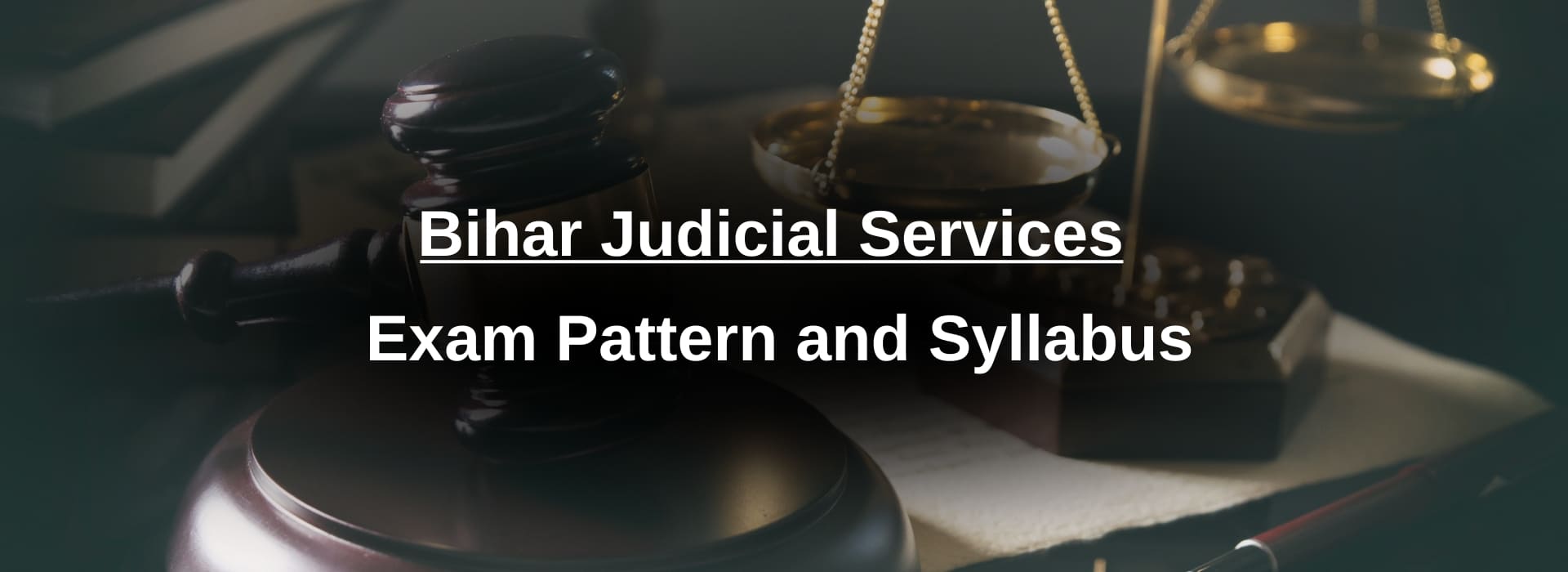
Bihar Judicial Services Exam Syllabus and Exam Pattern 2025
Introduction to Bihar Judiciary Exam Pattern 2025
If your goal is to pass the Bihar Judiciary Exam 2025, understanding the exam pattern is essential. Knowing how to prioritize subjects based on their importance will help you manage your study time effectively. This guide will walk you through the Bihar Judiciary Exam Pattern for all three stages—Prelims, Mains, and Interview. Read on to ensure you are well-prepared for each stage of the exam.
Stages of the Bihar Judiciary Exam 2025
The Bihar Judiciary Exam consists of three main stages:
- Preliminary Examination (Objective-type questions)
- Mains Examination (Written descriptive questions)
- Personal Interview
This article will explain each of these stages in detail, helping you understand how to prepare for the Bihar Judicial Services Exam.
Bihar Judiciary Exam Pattern 2025 for Prelims
The Prelims Exam for the Bihar Civil Judge Exam has two papers, as described below:
| Paper | Description | Marks |
|---|---|---|
| Paper 1 | General Studies / General Knowledge (MCQs) | 100 |
| Paper 2 | Law-related subjects (MCQs) | 150 |
Here’s a summary of the Prelims Exam pattern:
- Number of Papers: 2
- Total Marks: 250
- Total Duration: 210 minutes (Paper-I: 90 minutes and Paper-II: 120 minutes)
- Mode of Exam: Offline
- Question Type: Objective (MCQs)
The Prelims Exam tests your general awareness and knowledge of law. Focus on covering both General Studies and Law topics in your preparation.
Bihar Judiciary Exam Pattern 2025 for Mains
The Mains Exam for the Bihar Judiciary Exam 2025 includes the following structure:
| Number of Papers | 8 (a mix of compulsory and optional subjects) |
|---|---|
| Compulsory Subjects | 5 subjects (mandatory) |
| Optional Subjects | Choose 3 out of 5 subjects |
| Total Marks | 1050 |
| Mode of Exam | Offline |
| Question Type | Written (Descriptive/Narrative) |
Bihar Judiciary Mains Exam: Compulsory Subjects
The compulsory subjects in the Mains Exam are very important, especially since two of them—General Hindi and General English—are qualifying. You need to score a minimum of 30 marks in each of these papers to qualify for the rest of the exam.
| Sl. No. | Subject | Subject Code | Total Marks |
|---|---|---|---|
| 1 | General Knowledge (including current affairs) | 01 | 150 |
| 2 | Elementary General Science | 02 | 100 |
| 3 | General Hindi | 03 | 100 |
| 4 | General English | 04 | 100 |
| 5 | Law of Evidence & Procedure | 05 | 150 |
Bihar Judiciary Mains Exam: Optional Subjects
You need to select three optional subjects for the Mains Exam. Each of these subjects carries 150 marks. Here are the available options:
| Sl. No. | Subjects | Subject Code | Total Marks |
|---|---|---|---|
| 1 | Constitutional and Administrative Law of India | 06 | 150 |
| 2 | Hindu Law & Muhammadan Law | 07 | 150 |
| 3 | Law of Transfer of Property, Trusts, and Specific Relief | 08 | 150 |
| 4 | Law of Contracts & Torts | 09 | 150 |
| 5 | Commercial Law | 10 | 150 |
Bihar Judiciary Exam Pattern 2025 for Interview
After successfully completing the Mains Exam, candidates who qualify will be called for the Personal Interview stage. The Interview is worth 100 marks.
To be included in the final merit list, candidates must score at least 35% in the interview. The final selection will be based on the combined scores from the Mains Examination and the Interview.
You can check out some sample Bihar Judiciary Interview questions to get an idea of what to expect during this stage.
Conclusion: Tips for Success in Bihar Judiciary Exam 2025
Success in the Bihar Judiciary Exam requires dedication and consistent effort. Here are some helpful tips to guide you in your preparation:
- Get Familiar with the Exam Pattern: Make sure you understand the entire Bihar Judiciary Exam pattern, including Prelims, Mains, and Interview stages.
- Focus on Key Subjects: Prioritize important subjects like General Knowledge, Law, and State-specific laws in your study plan.
- Practice with Previous Papers: Work on solving past year question papers to familiarize yourself with the exam format and improve your speed.
- Stay Updated on Current Affairs: Regularly follow updates on current affairs, especially related to the Indian Constitution and Bihar laws.
- Consider Coaching: You may want to join a Judiciary coaching program to get expert guidance and a structured study plan.
By understanding the Bihar Judiciary Exam Pattern 2025 and following these tips, you’ll be better prepared for the exam. Stay focused, stay motivated, and give your best effort to achieve success in the Bihar Judiciary Exam.
The Bihar Judicial Services Exam is a comprehensive exam that requires dedication and smart study strategies. By understanding the syllabus, practicing regularly, and staying consistent, you can significantly improve your chances of success in the exam. Stay motivated, and use the resources and tips available to you. Remember, regular revision, mock tests, and practical experience are key to cracking the exam.